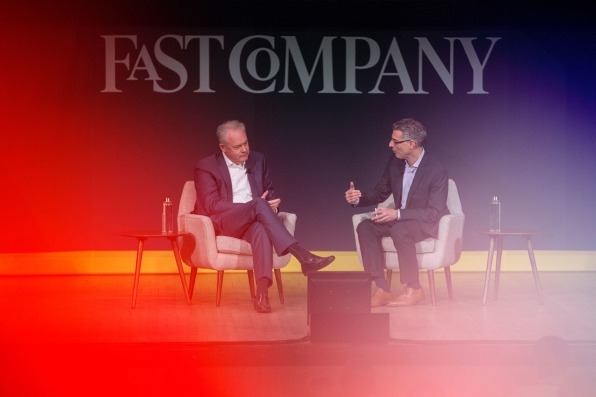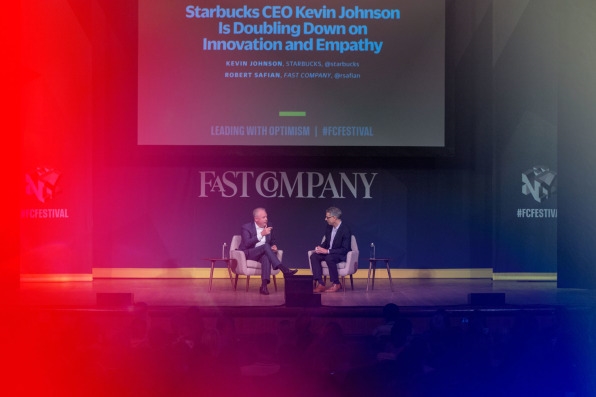Six years ago, Kevin Johnson—now the CEO of Starbucks, then the CEO of networking giant Juniper Networks—was diagnosed with melanoma. Despite the bad news, he remained committed to his work. But when he was in a San Francisco airport terminal awaiting a flight to meet with European customers, he mused about the fact that he’d canceled a doctor’s appointment to make the trip. Then he had an epiphany.
“I paused and asked myself, ‘Why am I doing this?’ That moment, I made a decision: that for the rest of my life, no matter how long or short, I would only do things that were joyful, with people I loved,” Johnson told Fast Company editor Bob Safian during a keynote this week at The Fast Company Innovation Festival. For Johnson, that meant retiring and leaving Silicon Valley for Seattle, where he’d spent years as a Microsoft executive and still had a home.
In retirement, Johnson got better. And in 2014, he found himself talking with Starbucks CEO Howard Schultz about a full-time job helping to run the company, where he had been a board member since 2009.

As Johnson was pondering his future, his wife chimed in with advice that he said “clarified things for me in about 15 seconds.” “If this would be fun for you, I think you should consider it,” she said. “If it wouldn’t be, don’t. But whatever you decide, don’t look back 15 years from now and say you wish you’d done it.”
Johnson decided that working at Starbucks could be consistent with the promises he made to himself in that SFO terminal. He became the company’s president and COO. Last December, he was appointed CEO, with Schultz becoming chairman and focusing his attention on the company’s new high-end Reserve stores.
Starbucks’ mission statement, which Johnson rattled off more than once during his festival appearance, is: “To inspire and nurture the human spirit—one person, one cup, and one neighborhood at a time.” That’s consistent with his personal goal of finding joy and being with people he loves. And most of his conversation with Safian was about human beings rather than coffee.
Starbucks has 330,000 employees—”partners” in its own parlance, reflecting the fact that they get equity in the company—and at first, Johnson did most of his meeting with them in carefully stage-managed visits to local shops. After deciding that the experience felt a bit “orchestrated,” he switched to meeting with small groups of partners for round-table discussions. “I want each one to share with me their life journey,” he explained. “And I’ll share my life journey with them.”

Those dialogues aren’t just about work. Johnson spoke of one Houston Starbucks employee whose home was flooded after hurricane Harvey, and who told him of her young son’s reaction: “Mommy, I don’t have a bedroom anymore.” In Baltimore, he met another worker who’d been homeless and whose brother had been murdered; he felt he had no purpose in life until he found a job at Starbucks.
“Every one of us at some point in their life has gone through adversity,” Johnson said. “That’s when they need compassion and empathy and support.”
As a company that needs to staff 27,000 stores in 75 countries, Starbucks is in a position to help people find their way past adversity on a vast scale. In 2015, it pledged to hire 10,000 “opportunity youth”—young people between the ages of 16 and 24 who are not in school and don’t have a job—and instead signed on four times that number a year ahead of schedule. Now it wants to hire 100,000 of them by 2020.
Starbucks committed to hiring 10,000 veterans and veteran spouses, an effort it also met faster than expected, whereupon it bumped the goal up to 25,000. Similarly, it aims to hire 10,000 refugees, inspired in part by vets it had hired who had worked with military translators in Afghanistan and Iraq who went on to become refugees. With the Trump administration imposing a temporary ban on refugee immigration (since ended), the latter hiring effort inspired a boycott, but Johnson says that Starbucks didn’t do it in order to court controversy: “It’s not about making a political statement, but we realize that at times, others will politicize what we do.”
Referencing various Starbucks initiatives that aspire to have a positive impact on society, Safian asked Johnson whether the company was engaging in do-goodism for its own altruistic sake, or because it’s good for business. “It’s both,” Johnson replied. “And that’s a beautiful thing.”
Fast Company , Read Full Story
(38)